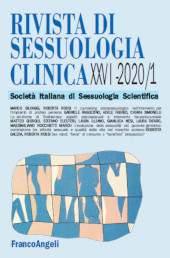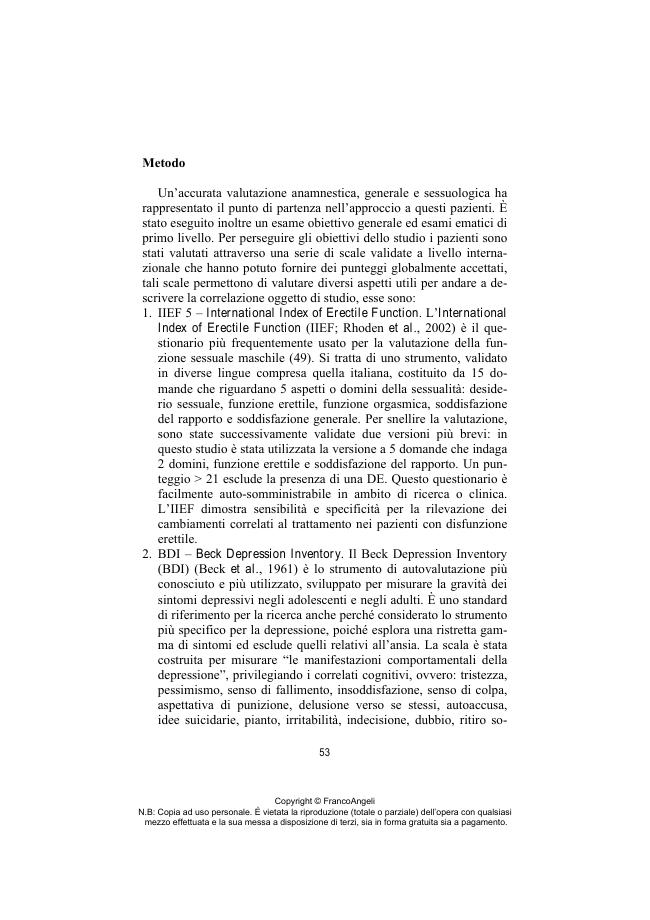L'evoluzione della sessualità nel paziente geriatrico : correlazione tra attività sessuale e qualità della vita nel maschio anziano
43-62 p.
L'invecchiamento della popolazione è attualmente uno dei fenomeni più significativi del ventunesimo secolo, con conseguenze importanti e di ampia portata per tutti i settori della società. La longevità umana è aumentata in modo significativo grazie a diversi fattori, tra cui sicuramente spiccano: l'adozione di stili di vita moderni e l'inarrestabile progresso scientifico. Tutto questo porta a comprendere che gli individui in età più avanzata, hanno iniziato a confrontarsi con una serie di stimoli e di necessità legate alla sessualità, che nel passato non venivano esperite. Ciò accadeva soprattutto per una serie di cliché e di pregiudizi di carattere meramente sociale che non rendevano l'attività sessuale nella sua interezza, e nello specifico quella in riferimento alla terza età, una esigenza collettivamente accettata e quindi degna di interesse.
Proprio perciò la comunità scientifica ha iniziato ad interessarsi a questo affascinante argomento soltanto negli ultimi decenni: in ambito medico l'affermazione dell'attività sessuale nei pazienti anziani diventa oggetto di studio e quindi di competenza specialistica, di geriatri, endocrinologi e andrologi. Alla base di questo studio osservazionale trasversale o cross sectional di tipo descrittivo, è stato reclutato un campione di 40 pazienti di sesso maschile, dai 65 ai 90 anni. Attraverso l'utilizzo di specifici test (IIEF 5; BDI; QLI; MMSE), so-no stati raccolti un insieme di dati che permettono di studiare in maniera dettaglia-ta una serie di aspetti: oltre alla funzione sessuale abbiamo indagato elementi co-me lo stato cognitivo, il tono dell'umore e la qualità della vita in generale.
I dati sono stati elaborati attraverso una precisa analisi statistica di tipo descrittivo e di tipo inferenziale attraverso metodiche di regressione lineare e di regressione multipla. L'obiettivo è quello di verificare una relazione tra la presenza/assenza di attività sessuale e la qualità di vita degli individui. Questo studio mira ad aumentare l'interesse generale verso le esigenze che il paziente anziano può manifestare, oggi più frequentemente rispetto a quanto accadeva in passato, in riferimento alla salvaguardia ed al mantenimento di una soddisfacente attività sessuale. [Testo dell'editore].
Population's aging is currently one of the most significant phenomenon in the XXI century, with very important consequences in every section of society. Human longevity has grown in a significant way thanks to differents factors: the meaningful ones are surely the adoption of modern lifestyles and the unstoppable scientific progress. All these factors bring to the conception that old people are fac-ing up to new sets of stimuli and necessities connected to sexuality; something that they would not have experienced in the past. This happened especially for a series of social cliché and prejudices which made old people's sexuality not accepted by the community and not so interesting.
Precisely for this, scientific community has started studying this fascinating theme only in the last few years. In medicine, the rising of sexual activity for old subjects has become a specific focus for geriatrisci-ans, endocrinologists, and andrologists. It has been shown that desire does not dis-appear in old age: also sexual arousal and orgasmic capacity persist. In old age, therefore, sexuality continues to be present, even if the ways and conditions through which it manifests and expresses itself are different.
The factors modifying the sexual response of the elderly male can be biological (e.g. erectile dysfunction, frequently caused by arterial pathologies that affect especially elderly men with hypercholesterolemia, diabetes, peripheral vasculopathy or hypertension, as well as smokers), psychosocial (e.g. lack of available partners, isolation from the active community, and other factors that feed the stereotype of the tired and inactive old man), and/or psychological (individual variability, life experiences, intro-jected taboo and stereotypes about older sexuality, attitude towards body chang-es, etc.). In this descriptive cross-sectional study, we recruited 40 male subjects between 65 and 90 years old. Subjects with clinical diagnosis affecting sexuality were excluded from the sample (i.e. patients undergoing pelvic surgery or radiotherapy; suffering from hypogonadism or hyperprolactinemia; affected by cognitive deficit or mood disorder).
Through the employment of specific tests: International Index of Erectile Function (IIEF 5); Beck Depression Inventory (BDI); Quality of Life Index (QLI) and Mini-Mental State Examination (MMSE), we collected data referred to some aspects: sexual function, cognitive state, mood, and general quality of life. Data have been elaborated with a descriptive and an inferential statistic analysis (linear and multiple regression). The aim of the study was to verify a possible relationship between presence/absence of sexual behaviour and individual's quality of life. We would like to stimulate a major interest in old subjects' needs in order to mantain and promote a long-life sexual health. Only through the spread of a new sensibility, towards these issues, it will be possible to promote the right of an affective and sexual health, without chronological limits, and to promote a satisfactory quality of life in elderly person on the physical, psychological and relational level, strengthening the concept of health itself.
Positive and significant rela-tions emerged, with both BDI and IIEF5 scores predicting QLI scores. Multiple regression models found that each score of BDI contribute to a diminution of 0.29 in the QLI score, while each score in the IIEF5 contribute to an increase of 0.13 in QLI score. IIEF5 scores has been found to increase QLI score in elderly men. An higher quality of life is recorded in patients who still benefit from a satisfying sex-ual activity; at the same time the quality of life is reduced in subjects with a de-creased mood tone, probably linked to a decline in sexual function. When the sex-ual function remains conserved, other important domains will be preserved, lot of them are important into the framework of global wellbeing. The conservation of a good sexual practice affects the elderly males' life, in a multifactorial way: from biological to psychosocial aspects. [Publisher's text].
Fa parte di
Rivista di sessuologia clinica : 1, 2020-
Articoli dello stesso fascicolo (disponibili singolarmente)
-
Informazioni
Codice DOI: 10.3280/RSC2020-001003
ISSN: 1972-5183
MATERIE
PAROLE CHIAVE
- Sessualità, Anziano, Affettività, Qualità della vita
- Sexuality, Old man, Affectivity, Quality of life



